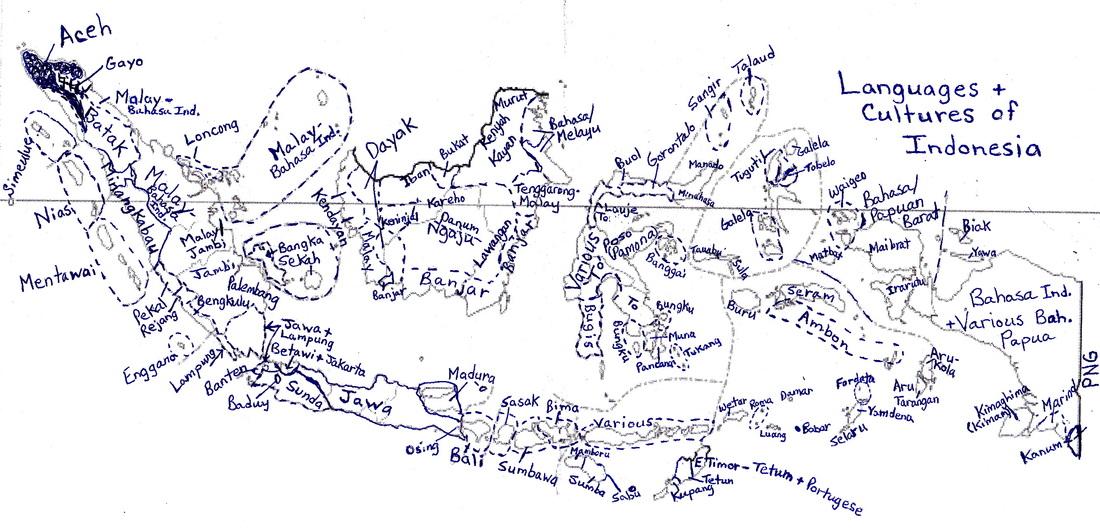languages of indonesia
The major distinct regional ethnic/cultural groups today which also include a distinct language or a dialect of Indonesian are: Aceh, Batak, Minangkabau, Lampung (on Sumatera); Sunda, Betawi, Jawa (on Java); Madura; Bali; Sasak (Lombok); Banjar, Dayak (Kalimantan); Bugis, Toraja, Gorontalo, various Batak dialects (Sulawesi); Bima (Sumbawa); Tetum and Uab Meto (W. Timor); and Manggarai (Flores). Of these, only two: Javanese and Sundanese, have a really large number of speakers; all the others number only several hundred thousand to several million (in a country with a population of 245 million!). For detailed language maps of the various islands of Indonesia, open this doc.
How do languages fit into the larger ethnic/cultural groups found across this vast country? Nearly all of the ethnic/regional languages are similar to Indonesian and share a large number of vocabulary words. This is true of Javanese, Sundanese, Minangkabau, Balinese, and so on. There are also a large number of cultural groups which do not have a distinct separate language - instead, their members all speak either Malay or Indonesian as their primary language. These include millions of Indonesians living in Sumatra, Riau, Kalimantan, Ambon, Makassar, and Manado, for example. The spreading and mixing of once distinct cultural groups has diffused Javanese and Sundanese far and wide, as people from these 2 dominant cultural groups have moved to nearly every island in Indonesian in search of economic opportunity. As a traveler, it is easy to find someone in Sulawesi who is Javanese and speaks basa Jawa, but much more difficult to find someone who speaks Muna (once a major language in Southeast Sulawesi), for instance. |
Indonesia is a vast archipelago stretching thousands of km. across dozens of large islands and thousands of small ones. It is no wonder it has the largest diversity of languages found in Southeast Asia. The main challenge facing a newly independent central government in the 1950s was how to unite all of the disparate cultures found here. A major aim was obviously to make everyone learn a common language through schooling.
The Indonesian government has been extremely successful in this regard. Nowadays, every Indonesian speaks the national language, bahasa Indonesia, which is a slightly altered form of the Malay trade language which was common throughout the archipelago and region. With the success of bahasa, the scope and importance of other once vibrant regional languages has decreased. And, dialects that were once more different than bahasa, have become more similar to it over time. For example, many of my Javanese friends, who live in the stronghold of Javanese culture (Yogya) sometimes have to admit that they don't know the word for something in Javanese, and have to ask their parents or a grandparent even. So, they routinely substitute Indonesian (bahasa) words when they talk to their friends in Javanese so that they are really speaking only 80% of the Javanese language as it was spoken only 2 generations ago. The success of Indonesian has caused it to bleed into the other major languages of Indonesia in this way, as successive generations use more bahasa and sometimes forget less used words in their own ethnic tongue. Today, Bahasa Indonesia, along with Malaysian, Javanese, and Sundanese can be found all across Indonesia. In a few places like Bali and Lombok, most locals still speak a distinct mother tongue similar to Indonesian, but different enough to call it a separate language. There are still hundreds of languages scattered across the island chain, but only a small number of people speak them anymore. Most people agree that Indonesian / Malaysian is one of the easiest languages to learn in the world for native English speakers. The language has no tones or difficult pronunciation. Grammar is relatively simple, without verb tenses, and revolves around roots, prefixes, and suffixes. It uses the Roman alphabet, and is easy to read. Living in Indonesia and taking lessons will quickly allow you to communicate. Several years of living there with occasional study leads most expats to an advanced level. In my opinion, studying Indonesian is one of the most rewarding language experiences anyone can have | ||||||||||||
audio samples
Others Coming Soon: Indonesian - Aceh & Madura areas, Sasak, Bima, Tetum, Uab Meto

